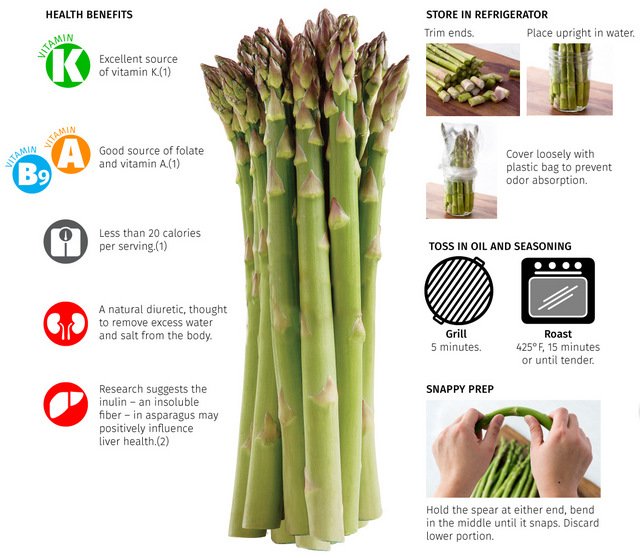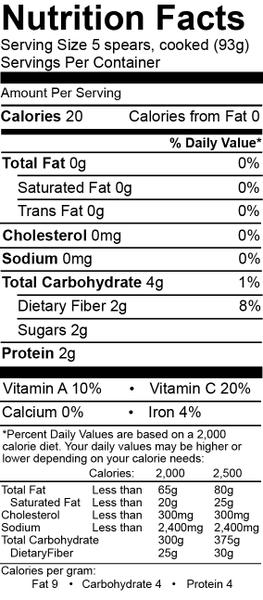How Healthy Is Asparagus? Nutritional Benefits And Health Effects

Table of Contents
The Nutritional Powerhouse of Asparagus
Asparagus is more than just a tasty treat; it's a nutritional powerhouse packed with essential vitamins, minerals, and antioxidants. Let's explore its impressive nutrient profile:
Vitamin and Mineral Content
Asparagus is a rich source of several vital nutrients:
- Vitamin K: Crucial for blood clotting and bone health. A single serving provides a significant portion of your daily recommended intake.
- Vitamin A: Essential for vision, immune function, and cell growth. Asparagus provides beta-carotene, a precursor to Vitamin A.
- Vitamin C: A potent antioxidant that supports the immune system and protects against cell damage.
- Folate (Vitamin B9): Essential for cell growth and development, particularly important during pregnancy.
- Potassium: An important electrolyte that helps regulate blood pressure and fluid balance.
- Iron: Necessary for red blood cell production and oxygen transport throughout the body.
Antioxidant Properties
Asparagus boasts an impressive array of antioxidants, including glutathione and various flavonoids. These compounds combat free radicals, unstable molecules that can damage cells and contribute to chronic diseases. Glutathione, in particular, is a powerful antioxidant that plays a crucial role in detoxification and protecting against oxidative stress. The flavonoids in asparagus contribute to its vibrant green color and provide additional antioxidant protection.
Fiber Content and Digestive Health
Asparagus is a good source of dietary fiber, both soluble and insoluble. Fiber promotes healthy digestion by adding bulk to the stool, preventing constipation, and supporting regular bowel movements. It also feeds beneficial bacteria in your gut, contributing to a balanced gut microbiota, crucial for overall health and well-being. This fiber content contributes to feelings of fullness, aiding in weight management.
Health Benefits of Asparagus Consumption
The impressive nutritional profile of asparagus translates into a wide range of potential health benefits:
Improved Heart Health
The potassium, fiber, and folate in asparagus contribute to improved cardiovascular health. Potassium helps regulate blood pressure, while fiber can help lower cholesterol levels. Studies have shown a correlation between higher intakes of folate and a reduced risk of heart disease.
Enhanced Immune Function
The high concentration of Vitamin C and other antioxidants in asparagus strengthens the immune system. These nutrients help protect your body against infections and diseases by bolstering the activity of immune cells.
Potential Cancer-Fighting Properties
Research suggests that certain compounds in asparagus, such as glutathione and other antioxidants, may have potential cancer-fighting properties. Studies have indicated a possible link between asparagus consumption and a reduced risk of certain cancers, although more research is needed to confirm these findings definitively. It's important to remember that asparagus is not a cure for cancer, but it may contribute to a healthy diet that supports cancer prevention.
Blood Sugar Regulation
Asparagus's fiber content and low glycemic index (GI) can help regulate blood sugar levels. Fiber slows down the absorption of sugar into the bloodstream, preventing spikes in blood glucose. This is particularly beneficial for individuals with diabetes or those at risk of developing the condition.
Potential Drawbacks and Considerations
While asparagus offers numerous health benefits, it's essential to consider potential drawbacks:
Allergies and Sensitivities
Although rare, some individuals may experience allergic reactions to asparagus, ranging from mild skin irritation to more severe symptoms. Symptoms can include itching, rash, or digestive upset. If you experience any adverse reactions after consuming asparagus, discontinue use and consult a doctor.
Drug Interactions
Asparagus may interact with certain medications, particularly those affecting blood clotting. Individuals taking anticoagulants (blood thinners) should consult their doctor before significantly increasing their asparagus intake.
Preparation and Cooking Methods
To maximize the nutritional value of asparagus, opt for cooking methods that minimize nutrient loss. Steaming, grilling, or roasting are excellent choices. Overcooking can reduce the concentration of certain vitamins and antioxidants.
Conclusion
Asparagus is a nutritional powerhouse offering a wealth of vitamins, minerals, and antioxidants that contribute to improved heart health, enhanced immune function, and potential cancer-fighting properties. While generally safe, be mindful of potential allergies and drug interactions. Discover the delicious and nutritious benefits of asparagus today! Add this versatile vegetable to your meals and experience its remarkable health effects firsthand. Learn more about incorporating asparagus into a healthy diet and find new recipes online!

Featured Posts
-
 I Parakoloythisi Tis Ygeias Me Ypologistes Apo Ines Pragmatikotita I Oneiro
Apr 30, 2025
I Parakoloythisi Tis Ygeias Me Ypologistes Apo Ines Pragmatikotita I Oneiro
Apr 30, 2025 -
 Unos Studentky Sone Obnova Konania Sa Pojednava V Stredu
Apr 30, 2025
Unos Studentky Sone Obnova Konania Sa Pojednava V Stredu
Apr 30, 2025 -
 Iva I Siyana Istoriya Na Uspekha I Predstoyaschi Proekti
Apr 30, 2025
Iva I Siyana Istoriya Na Uspekha I Predstoyaschi Proekti
Apr 30, 2025 -
 39 Approval Assessing President Trumps First 100 Days In Office
Apr 30, 2025
39 Approval Assessing President Trumps First 100 Days In Office
Apr 30, 2025 -
 Asparagus Nutrition How This Vegetable Supports Your Health
Apr 30, 2025
Asparagus Nutrition How This Vegetable Supports Your Health
Apr 30, 2025
Latest Posts
-
 Inside Michael Sheens Life From Famous Relationships To Wealth And A Hollywood Departure
May 01, 2025
Inside Michael Sheens Life From Famous Relationships To Wealth And A Hollywood Departure
May 01, 2025 -
 Michael Sheen Exes Net Worth And Hollywood Exit
May 01, 2025
Michael Sheen Exes Net Worth And Hollywood Exit
May 01, 2025 -
 Bartlett Texas Fire Leaves Two Structures As Total Losses Under Red Flag Conditions
May 01, 2025
Bartlett Texas Fire Leaves Two Structures As Total Losses Under Red Flag Conditions
May 01, 2025 -
 Red Flag Warning Fuels Devastating Bartlett Texas Fire Two Structures Lost
May 01, 2025
Red Flag Warning Fuels Devastating Bartlett Texas Fire Two Structures Lost
May 01, 2025 -
 Combating Homelessness Prince Williams Scottish Crusade Includes Meeting With Gail Porter
May 01, 2025
Combating Homelessness Prince Williams Scottish Crusade Includes Meeting With Gail Porter
May 01, 2025
